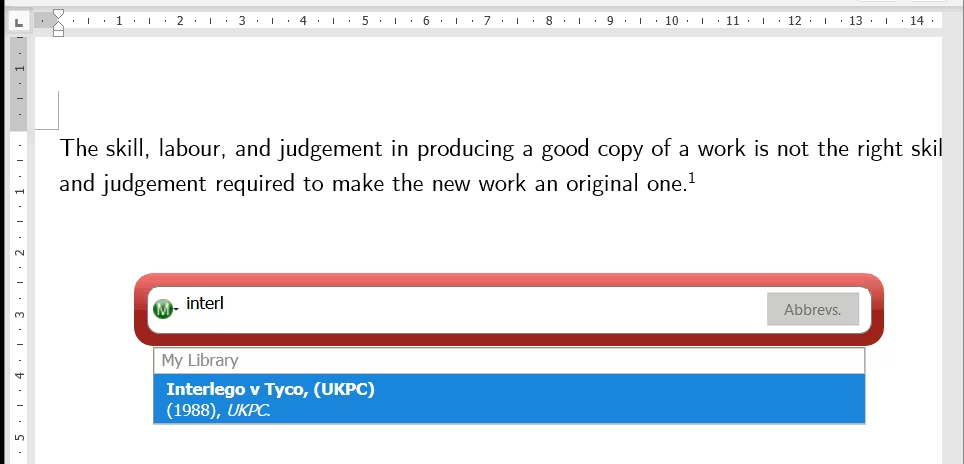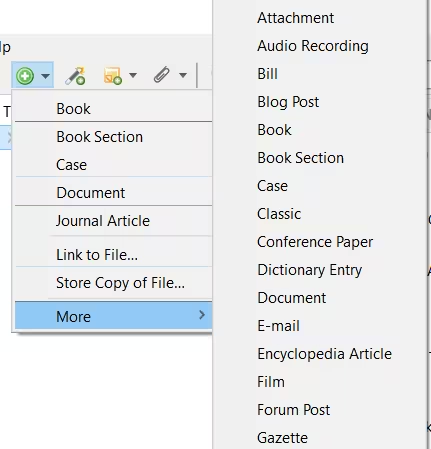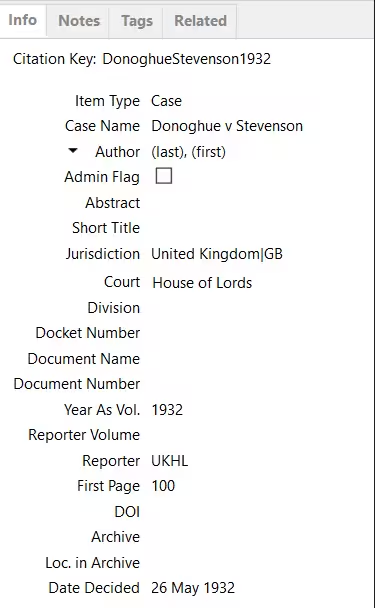Automatic OSCOLA Citations with Juris-M
How to manage and cite cases, legislation, commentary, etc.
Citing legal sources in OSCOLA is more straightforward than in many other citation styles. Citations are short, fairly intuitive, and usually can be copied directly from the material being cited. Each citation is a standalone footnote, and no bibliography is required. Problems arise if you cross-reference between footnotes (e.g. using ibid, or "n 6", etc.) and later do heavy editing, because you then have to keep the numbering straight. But if you're willing to be more verbose, and keep all your citations independent, those problems can be avoided.
What is unavoidable, however, is the overhead involved when keeping track of a large number of citations. This is not a big deal for short-form legal writing. But where your citations run well into the double-digits, this can quickly become unwieldy. You might find yourself looking up the same citation for the same source again and again, or keeping many documents open just to copy-and-paste your citations. And if you're in the habit of copying-and-pasting from a previous footnote, one uncaught typo in a major source can quickly multiply across the whole document.
Citation managers offer a solution to this problem. The general concept is you collect sources when doing research and reading, creating a personal (or project-specific) database of sources. Later, when you write, you can cite from an autocompleted list of sources populated from this database.

A number of citation managers exist: Zotero, Mendeley, OneNote, etc. But there is only one I am aware of that supports non-American legal citations. It is a fork of Zotero known as Juris-M. Frank Bennett, an Associate Professor of Law at Nagoya University, Japan, forked Zotero to add support for multilingual citations and jurisdictions. These added features are quite essential because legal writing often involves references to related caselaw and commentary on similar issues in other jurisdictions. There will also often be many layers of law overlapping with national law. In monist systems, international law has direct effect, and so treaties and international caselaw may need to be cited directly. Even in dualist systems, these legal sources will often be used to interpret the relevant implementing national law. In other words, a citation manager with support only for the American Bluebook will be a woefully inadequate one.
Juris-M Workflow
Citing sources using Juris-M is similar to 'hand-crafted' Ctrl-C-Ctrl-V citations. It involves the following steps:
- Locate your sources
- Add your source to Juris-M (you can do this manually, by creating an entry and keying in a few fields, or by clicking a button in your web browser)
- Cite your source in your text editor (e.g. Microsoft Word) by clicking a button in the editor
Installation
There are 3 components to Juris-M. Only the client is compulsory.
- Juris-M client — install this from the Juris-M website
- Web Browser 'Connector' — this is a browser extension that helps you quickly add sources to Juris-M; install it from the Juris-M website as well or from the client after you install it
- Text Editor 'Add-On' — this is an add-on for your preferred text editor; the client will prompt you to install this
Creating Entries
Adding and citing entries using Juris-M/Zotero is fairly intuitive. What I found less obvious was how to cite specific types of sources manually. This is important where the source is not available online (and so the Connector can't help me do it automatically), or the Connector simply doesn't support the source yet. For this reason I've set out instructions for citing various types of legal sources below, across the EU, UK, Singapore, and neutral citations for Hong Kong, Australia, and New Zealand.
Much of this will be repetitive, so I won't bother providing screenshots or step-by-step instructions for each type of source. I'll simply set out the source type, the fields to be filled, and what information to put in those.
The source type is also known as the item type — it's the type of item in Zotero / Juris-M. When you create a new item, it's the field right at the top. You specify the item type when creating an item by clicking the green plus icon, then the item type.

The fields to which I will refer are those listed on the right panel in the Juris-M interface. These may change in future Zotero / Juris-M versions. Feel free to let me know if I neglect to update the guidance here.

European Union Caselaw (CJEU)
- Type: Case
- Case Name: the title of the case, e.g. "Rewe-Zentral AG v Bundesmonopolverwaltung für Branntwein"
- Short Title: if applicable, the commonly-used title, e.g. Cassis de Dijon, or KitKat II
- Jurisdiction: "EU.INT|Court of Justice"
- Docker Number: the case citation, e.g. C-120/78
This produces:
Case C-120/78 Rewe-Zentral AG v Bundesmonopolverwaltung für Branntwein
Besides the case reference, you can also include an ECLI identifier by putting it in the "Reporter" field.
Case C-120/78 Rewe-Zentral AG v Bundesmonopolverwaltung für Branntwein ECLI:EU:C:1979:42
Journal citations don't seem to be supported elegantly, but you can shoehorn one in if you like by putting it in the Reporter field (e.g. [1979] 3 CMLR 494)
Case C-120/78 Rewe-Zentral AG v Bundesmonopolverwaltung für Branntwein [1979] 3 CMLR 49
England and Wales (UK)
Legislation
Acts of Parliament and secondary legislation
- Type: Statute
- Name: Name of the Act, Regulation, etc. (e.g. Salmon Act 1986)
- Short Title: if applicable
- Jurisdiction: United Kingdom|GB
You probably want to cite a specific section or paragraph in the Schedule of the legislation rather than the whole thing. In that case, you'll need to use 'pinpoints'. In the Juris-M citation interface, specify the relevant section you want to cite. If you want to cite a rule, order, regulation, Schedule, etc. that isn't specified in the dropdown list, you can put your pinpoint citation in the suffix field (e.g. ", Sch 1 para 1(1)(a)")

Salmon Act 1986, s 32
Caselaw
This works with both neutral citations and law report citations.
- Type: Case
- Name: name of the case (e.g. Interlego v Tyco)
- Short Title: if applicable
- Year As Vol: the year for your neutral citation / law report citation (e.g. 1988)
- Reporter: neutral / law journal abbreviation (e.g. UKPC, AC, All ER, etc.)
- First Page: first page on which the case appears (e.g. 3)
Interlego v Tyco [1988] UKPC 3
Pinpoints can be placed by specifying a paragraph to be cited, or by using the suffix field.
Commonwealth Caselaw
Caselaw from other Commonwealth jurisdictions can be cited in the same manner as England & Wales caselaw if the jurisdiction is set to "United Kingdom|GB". Setting the jurisdiction to the correct jurisdiction (e.g. Hong Kong | HK, Singapore|SG) causes formatting problems, probably because the formatting hasn't been correctly configured for these Commonwealth jurisdictions yet.
Hong Kong
- Type: Case
- Name: Oriental Press Group v Fevaworks Solutions
- Short Title: Oriental Press
- Year As Vol: 2013
- Reporter: HKCFA
- First Page: 47
Oriental Press v Fevaworks Solutions [2013] 1 HKCFA 47
Setting jurisdiction to GB|Hong Kong also works.
Singapore
- Type: Case
- Name: Quoine v B2C2
- Year As Vol: 2020
- Reporter: SGCA(I)
- First Page: 2
Quoine v B2C2 [2020] SGCA(I) 2
Australia
- Type: Case
- Name: Dow Jones v Gutnick
- Year As Vol: 2002
- Reporter: HCA
- First Page: 56
Dow Jones v Gutnick [2002] HCA 56
New Zealand
- Type: Case
- Name: Loosley v Powell
- Year As Vol: 2018
- Reporter: NZCA
- First Page: 3
Loosley v Powell [2018] NZCA 3